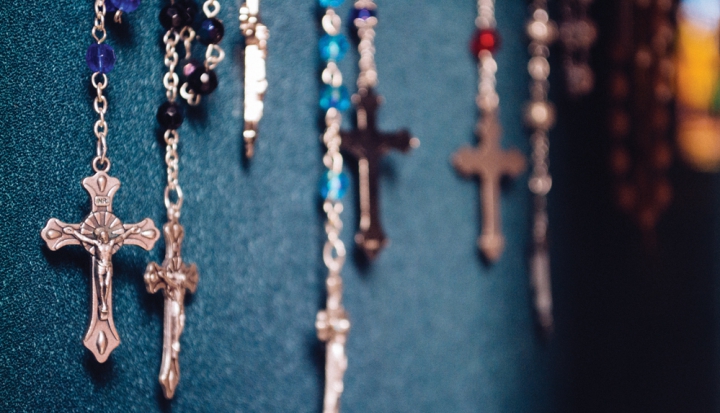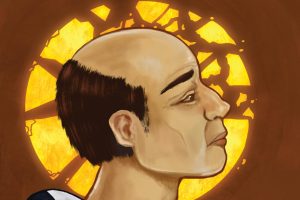I was visiting a third grade recently when we got into a conversation about prayer beads and how pretty much every religion has some form of prayer beads, from the Catholic rosary to Buddhist malas to Islamic misbaha, which have 99 beads to signify the 99 names of God. We got to talking about how prayer beads are essentially meditative devices, tactile instruments for concentrated chant, which is a way to let go of the usual conscious inundation and open doors and windows for the signs and songs of the everywhere holy, as the visitor, to his surprise, found himself saying; chanted or murmured or interior repetitive prayer is music, really, isn’t it, as one shy child said, brilliantly.
We talked about people we knew who carried rosaries, moms and dads and aunts and grandparents and Sister Teacher beaming in the back row. We talked about the moving and sometimes haunting collective praying of the rosary, which was a regular feature of my childhood but not, apparently, of theirs. We talked about how still in many cases when a Catholic man or woman died, there would be a collective chanting of the rosary the night before the funeral, another custom that appears to be slowly fading from the world. And then I talked about how when I was a cheerful Sunday school teacher for my parish I would hand each of my young charges a tiny one-decade wooden rosary, on the general principle that everyone ought to have a rosary, and smaller rosaries are friendlier and handier and easier to slip in and out in and out of pockets than large ones which feel like ship cables and get caught easily on keys and pens and buttons and zippers, and wooden rosaries are the warmest and friendliest of all, and arguably holiest too, as they are composed of formerly living beings through which the vibrant jazz of life once coursed, beings who ate sunshine and minerals and yearned for light and harbored many other beings in their branches and burrows; and then I mentioned that I’d recently lost the tiny wooden rosary that I carried ever since I was a Sunday school teacher, to remember those wild holy children by; my poor little rosary, handled and dandled so many thousand times, had finally come apart, though I had saved some of the beads in the tiny box all of us have somewhere in which to save the talismans of those and what we love in our lives.
So you don’t have a rosary yourself? Said a moppet.
I don’t, I said. I am sans rosary, rosaryless, bereft at beadlessness for the moment, I said. I suppose I will find another rosary soon enough but for the moment I am a beadless man, a sad state of affairs. And then the bell rang, and the class ended, and the children flew away like birds, but one small girl remained. She was eight years old, she said, and her name was Mayar, which means the sun’s light on the moon, and her grandparents had come to America from Lebanon many years ago, and her grandmother had given her three rosaries at her First Communion, a red one and a white one and a blue one, and she carried them with her in a secret pocket in her backpack, because she loved her grandmother, and every time she thought of the three rosaries, maybe that was a prayer for her grandmother, but she would give me any of the three I chose, because everyone ought to have a rosary, as I had said, and if she had three and I had none, then she would give me one. Her grandmother would certainly have approved of such a gift. That was the sort of person her grandmother had been, as generous as anyone who ever was.
She dug the rosaries out of the secret pocket in her backpack and I tried not to cry as she spread them out and said You take what you like. After a minute I chose the blue rosary because the Madonna wore blue. I told Mayar that I would pray my first rosary on the blue rosary for her grandmother and she said thank you and we shook hands and I have the blue rosary in my pocket as I finish this sentence and I hope that you will join me in a prayer for Mayar and her grandmother and you and me and everyone who yearns for the light. Amen.
This article also appears in the May 2018 issue of U.S. Catholic (Vol. 83, No. 5, pages 36–37).















Add comment